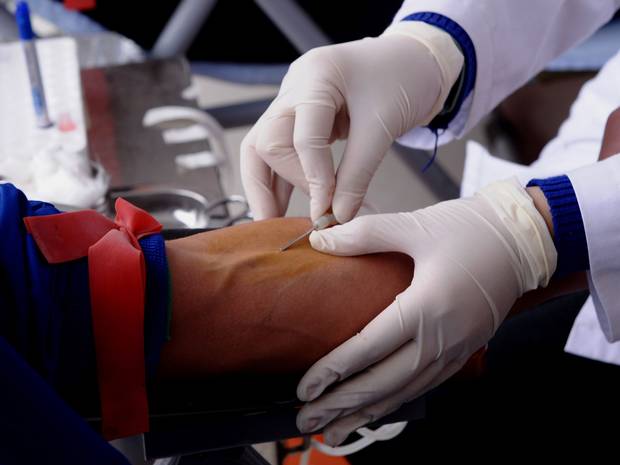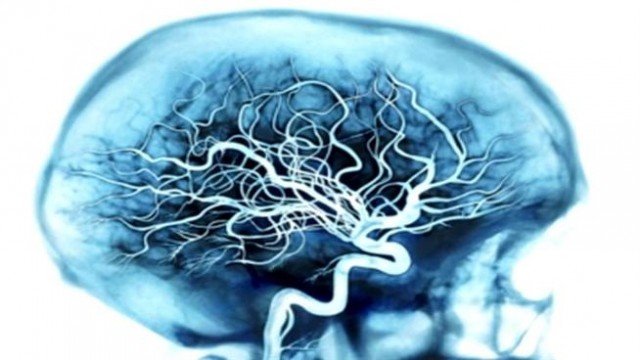A blood test to predict the onset of Alzheimer’s disease is being under development.
Research in more than 1,000 people has identified a set of proteins in the blood which can predict the start of the dementia with 87% accuracy.
The findings, published in the journal Alzheimer’s & Dementia, will be used to improve trials for new dementia drugs.

A blood test to predict the onset of Alzheimer’s disease is being under development (photo Getty Images)
Experts warned that the test was not yet ready for doctors’ surgeries.
Research into treatments for Alzheimer’s disease has been plagued by failure. Between 2002 and 2012, 99.6% of trials aimed at preventing or reversing the disease flopped.
Doctors believe the failure is down to treating patients when it is already too late, since symptoms appear around a decade after the start of the disease.
Identifying patients earlier is one of the priorities for dementia research.
The British research group, which combines university and industry scientists, looked for differences in the blood of 452 healthy people, 220 with mild cognitive impairment and 476 with Alzheimer’s disease.
They were able to tell with 87% accuracy which patients with mild cognitive impairment would go on to develop Alzheimer’s disease in the next year.
US researchers have discovered that a blood test can accurately predict the onset of Alzheimer’s disease.
Scientists at Georgetown University in Washington DC showed that testing levels of 10 fats in the blood could predict – with 90% accuracy – the risk of the disease coming on in the next three years.
Their findings, published in Nature Medicine, will now be tested in larger clinical trials.
Experts said the results needed to be confirmed, but such a test would be “a real step forward”.
The number of people living with dementia stands at 44 million around the globe and is expected to treble by 2050.
The disease silently attacks the brain for more than a decade before any symptoms emerge. Doctors think drug trials are failing because patients are simply being treated too late to make a difference.

Georgetown University researchers have discovered that a blood test can accurately predict the onset of Alzheimer’s disease
This is why discovering a test that predicts the risk of dementia is a major priority for the field.
Researchers analysed blood samples from 525 people over the age of 70 as part of a five-year study.
They took 53 of them who developed Alzheimer’s or mild cognitive impairment and compared their blood with 53 who stayed mentally agile.
They found differences in the levels of 10 lipids, or fats, between the two groups.
And when the research team looked in the other blood samples, those 10 markers of Alzheimer’s could predict who was likely to enter mental decline in the following years.
The full power of the test has not been investigated either. So far they know a diagnosis of dementia can be predicted three years ahead of time, but the researchers are now investigating whether the test works even earlier.
It is not clear exactly what is causing the change in fats in the blood, but it could be a residue of the early changes in the brain.
Researchers say they are closer to developing a blood test that could diagnose Alzheimer’s.
There is no definitive test for the brain-wasting disease. Doctors rely on cognition tests and brain scans.
A technique published in the journal Genome Biology showed differences in the tiny fragments of genetic material floating in the blood could be used to identify patients.
The test was accurate 93% of the time in trials on 202 people.
One of the main goals of Alzheimer’s research is to find ways of detecting the disease earlier.

Researchers say they are closer to developing a blood test that could diagnose Alzheimer’s
It starts years before symptoms appear and it is thought that future treatments will need to be given before large parts of the brain are destroyed. This will require new ways of testing for the condition.
The team at the Saarland University, in Germany, analyzed 140 microRNAs (fragments of genetic code) in patients with Alzheimer’s disease and in healthy people.
They found 12 microRNAs in the blood which were present in markedly different levels in people with Alzheimer’s. These became the basis of their test.
Early trials showed it was successful and was “able to distinguish with high diagnostic accuracies between Alzheimer’s disease patients and healthy” people.
However, more research to improve accuracy and to see whether it would work in the clinic is still needed before the test would be considered as a way of diagnosing patients.



